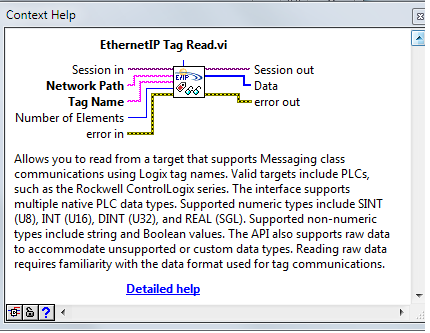Search the Community
Showing results for tags 'actors'.
-
I'm somewhat new to Actor framework and this is my first major project using it. I've completed a few simple Actors before and integrated them into larger applications. I am communicating with a device over Ethernet. A proprietary program takes in ASCII commands and passes them to the device. Data is returned along the same TCP connection as ASCII strings. I want to display the data to the user in a UI. In the future, the proprietary communication program may be swapped out for a custom in-house program. There are likely to be different UIs in the future. I decided to create 3 Actors: a Hardware Interface / Listener actor, a Controller actor, and a UI actor. I want to keep communication between the three Actors simple and consistent, so potential future Actors are able to handle the same messages. The Listener and UI actors may be substituted for other actors in the future (a certainty in the case of the UI actor). A critical task of the UI is to be able to display the parameters/settings of the device. There are several dozen different settings. The UI is interested in displaying some of them as indicators, issuing warnings depending on other parameters, and ignoring other updates. The UI's response to a specific parameter would change depending on which UI is being used. What I'm struggling with is this: Which Actor should store the hardware's current parameters/settings? Should there be multiple copies of the hardware's current settings in each Actor? How should the parameters be passed around? Should there be an abstract Parameter class? If I used an abstract Parameter class, would dynamic dispatch be the best way to handle different UI reactions? I'm afraid of coupling Actors too tightly together. On the other hand, it's not clear to me where the Parameter data should be stored, because it seems like the Controller and UI would need to have access to it. Should it be stored in the Controller and passed up to UI as needed? If anyone has any thoughts/advice, I'd greatly appreciate it.
-
I have a question relating to inheritance in one of my programs. When at a customer's site we have Ethernet IP available, which will ultimately be what is used for communication between a PLC and our application upon delivery. However, because I don't have ethernet IP available elsewhere, I was hoping to use TCP/IP when in the office and write a simulator to substitue for E-IP when I don't have it available . The issue is, it doesn't really make sense to have TCP/IP and ethernetIP classes both inherit from a same base class (say, communication class) because the ethernet IP drivers don't really have similar functionality to TCP/IP exposed. With ethernet IP, although it uses TCP/IP underneath it, the API is just a polymorphic VI with an input for the address and tag name. You don't need to open anything, or hold a reference to the session etc. I am wondering if there is some way to set up the class structure so I can easily switch out ethernetIP with TCP/IP and vice versa, even if it does not make sense for them to both inherit from the same base class.
- 6 replies
-
- inheritance
- oop
-
(and 1 more)
Tagged with:



